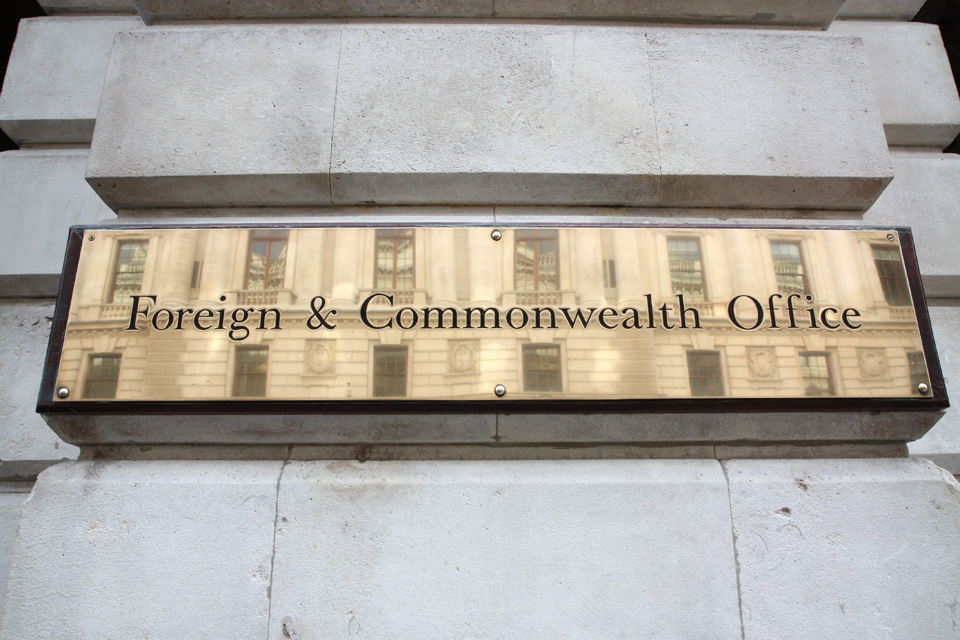Baroness Anelay speech at Peacekeeping Summit in Paris
The Minister for Human Rights reasserted the importance of the UK's 3Ps agenda in reforming peacekeeping at the conference on Peacekeeping in Francophone Environments.

Good morning. I would like to extend my thanks to France and the co-hosts for organising this important event.
The UK is firmly committed to the common goal of better peacekeeping, both in New York and in the field. We have troops deployed in Cyprus, Somalia and South Sudan, and staff officers serving in the francophonie in Mali and the DRC.
We are all aware of the challenges of peacekeeping. However, the international community is also increasingly united in their will to improve the process.
From the historic Leaders’ Summit in New York last year, to September’s Peacekeeping Defence Ministerial in London and this conference here today, we have already made progress.
The London Communiqué, signed by 63 countries, provides a blueprint for peacekeeping reform. It calls for improvement in three areas - areas that we call the 3Ps of peacekeeping – planning, pledges and performance.
My German colleague has spoken about planning. The UK wants planning to be coordinated across the UN system, and with the Security Council. That is why we have invested in the Strategic Planning and Analysis Unit in the Executive Office of the Secretary General.
Minister Ali has discussed pledges. The UN must continue to identify the specific needs of each mission, and Member States must step up to meet those needs. That is why the UK expanded our commitment to South Sudan with the provision of a Level 2 hospital in Bentiu, where the UN needed it most. That’s why I was proud that the London Ministerial last month continued the work of the Leaders’ Summit, by announcing 30 new pledges of peacekeeping troops and equipment. Those pledges include new commitments to rapid deployment that will help peacekeepers reach the people who need them faster.
However, having the right plan and the right people in place is no good if they do not perform effectively.
I urge the UN and Member States to work together to ensure that we prepare our troops to perform. This means establishing a common training curriculum, coordinating between the Member States that need training and those that can offer it, whilst strengthening our processes for identifying, appointing and mentoring mission leaders.
Crucially, we must also address under-performance and misconduct. We must end the scourge of Sexual Exploitation and Abuse by peacekeepers. Incidents must be reported to the Security Council and the UN, and national authorities must take action to hold them to account, including repatriating them where appropriate.
Of course the women, peace and security agenda underpins all of our work on the 3Ps. We must fulfil the commitment made in London to double the number of women in UN peacekeeping operations by 2020. Women such as Major Issaka, a soldier from Niger serving in Mali, to whom I presented the first UN Military Gender Advocate of the Year award. I want to see more women like Major Issaka in every mission.
The United Kingdom is playing its part. We have appointed a military Gender Champion, General Sir Gordon Messenger, our Vice-Chief of Defence Staff. We are opening up military combat roles to women; updating our military doctrine to reflect the women, peace and security agenda; increasing the number of gender advisers ready for deployment; and ensuring that our training for UK and foreign troops covers the topic of prevention of sexual violence in conflict. I urge all of those present to appoint your own Gender Champions and to ensure that peacekeeping benefits from the indispensable skills of women.
As we move into the era of a new Secretary-General, to whom I pay tribute, I believe that together, we have already mapped out a path to better peacekeeping. The United Kingdom is firmly committed to that path.
Now it is time for us all to turn the commitments made in New York, London and here today, into real improvements on the ground. It is time to start applying the ideas of the 3Ps to practice.
It is time to lay the foundations for better peacekeeping.
It is important that we do so for the benefit of our generation and for generations to come who deserve and need peace.
Further information
-
Follow Foreign Office Minister Baroness Anelay on Twitter @JoyceAnelay
-
Follow the Foreign Office on Twitter @foreignoffice and Facebook
-
Follow the Foreign Office on Instagram, YouTube and LinkedIn